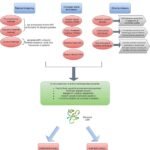Australia – The humble marine sandworm may help in the hunt for a new class of antibiotics after University of Queensland researchers improved a molecule in the sand-dwelling animal which kills superbugs.
UQ’s Institute for Molecular Bioscience researcher Dr Alysha Elliott said the study assessed peptides inspired by natural antibiotics in sandworms to see if they could kill multi-drug resistant strains of bacteria.
“A Danish biotechnology company asked for our help to investigate a small peptide called arenicin-3 that they found in the marine sandworm Arenicola marina, which could kill Gram-negative bacteria — including strains resistant to last-resort antibiotics,” Dr Elliott said.
“Gram-negative bacteria have evolved to outsmart our current antibiotics, but natural antibiotics like the one found in the sandworm can penetrate the cell membrane of bacteria.”
Dr Elliott said Gram-negative bacteria were more difficult to kill due to an additional sophisticated line of defence in their membranes.
UQ IMB scientists Dr Alysha Elliott and Dr Johnny Huang were part of the research team led by Professor Matt Cooper that tested arenicin-3 and new compounds inspired by the marine sandworm.
“While many of the initial compounds were remarkably active in killing the bacteria, they were toxic to human cells including red blood cells, and did not work well in the presence of lung surfactant,” Dr Huang said.
“This would be an issue if we wanted to treat bacterial pneumonia where the infection is found in the lung.”
Stay Always Informed
Join our communities to instantly receive the most important news, reports, and analysis from the aquaculture industry.
The researchers kept tweaking the structure of the peptide and succeeded in developing AA139 that could kill multi-drug resistant bacteria in many models of disease, with far fewer side effects.
“Our next challenge is to get this peptide to where the infections are found,” Dr Elliott said.
“Many bacterial infections are deep-seated, requiring penetration through tissue to reach them. This is a tough challenge for a peptide antibiotic, although there remains a dire unmet medical need for new antibiotics.
Contact
Dr Alysha Elliott Aparicio
Research Fellow
Institute for Molecular Bioscience
+61 7 334 62745
a.elliott@imb.uq.edu.au
Reference (open access):
Elliott, A.G., Huang, J.X., Neve, S. et al. An amphipathic peptide with antibiotic activity against multidrug-resistant Gram-negative bacteria. Nat Commun 11, 3184 (2020). https://doi.org/10.1038/s41467-020-16950-x
Source: The University of Queensland
Editor at the digital magazine AquaHoy. He holds a degree in Aquaculture Biology from the National University of Santa (UNS) and a Master’s degree in Science and Innovation Management from the Polytechnic University of Valencia, with postgraduate diplomas in Business Innovation and Innovation Management. He possesses extensive experience in the aquaculture and fisheries sector, having led the Fisheries Innovation Unit of the National Program for Innovation in Fisheries and Aquaculture (PNIPA). He has served as a senior consultant in technology watch, an innovation project formulator and advisor, and a lecturer at UNS. He is a member of the Peruvian College of Biologists and was recognized by the World Aquaculture Society (WAS) in 2016 for his contribution to aquaculture.




